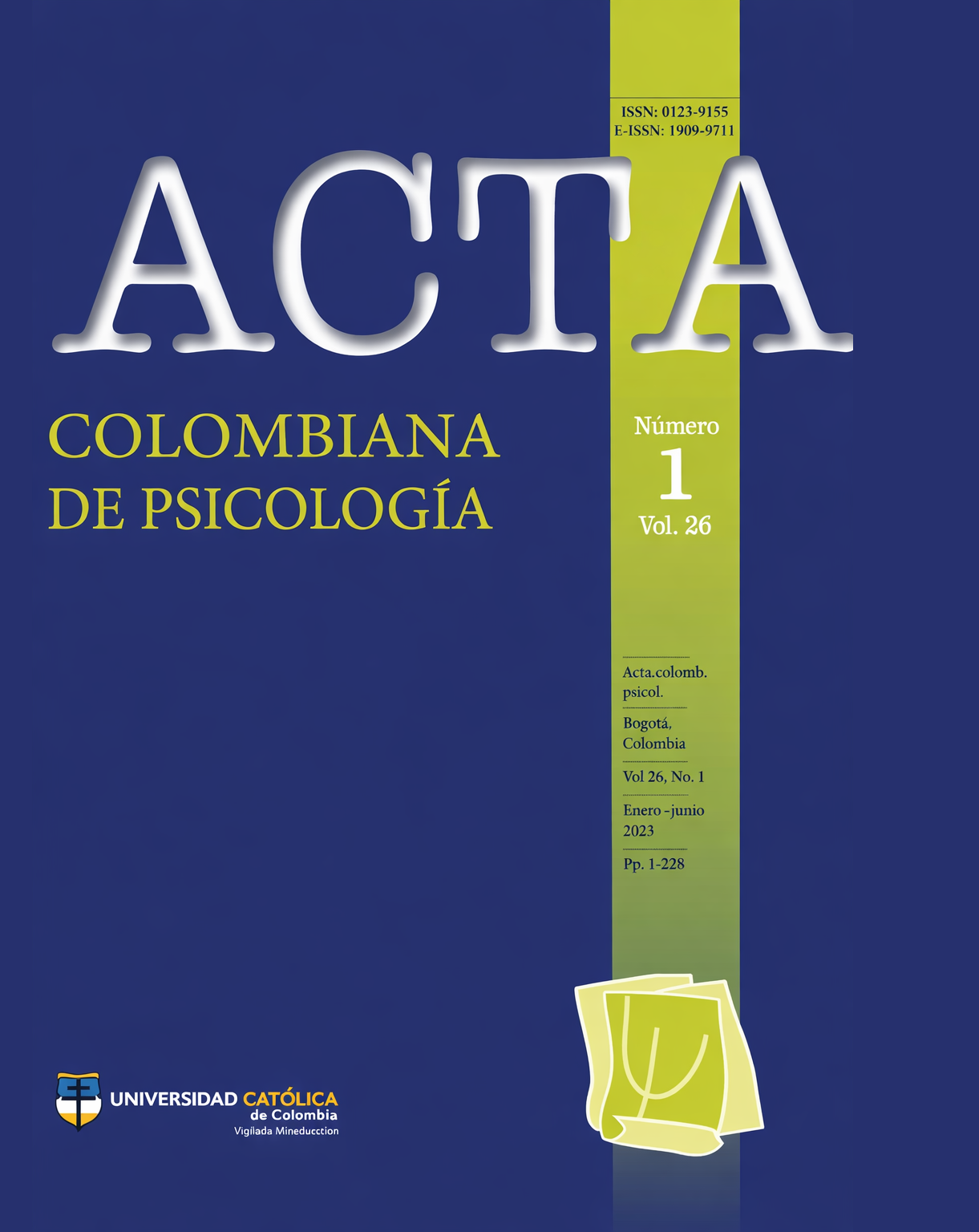
This work is licensed under a Creative Commons Attribution-NonCommercial-ShareAlike 4.0 International License.
Authors who publish in this journal agree to the following terms:
Acta Colombiana de Psicología complies with international intellectual property and copyright laws, and particularly with Article No. 58 of the Political Constitution of Colombia, Law No. 23 of 1982, and the Agreement No. 172 of September 30, 2010 (Universidad Católica de Colombia Intellectual Property Regulation).
Authors retain their copyright and grant to the Acta Colombiana de Psicología the right of first publication, with the work registered under Creative Commons attribution license, which allows third parties to use the published material, provided they credit the authorship of the work and the first publication in this Journal.

References
Aparicio, J. R. (2012). Rumores, residuos y Estado en “la mejor esquina de Sudamérica”. Universidad de los Andes.
Bernasconi, O. Lira, E. & Ruiz, M. (2019) Political Technologies of Memory: Uses and Appropriations of Artefacts that Register and Denounce State Violence. International Journal of Transitional Justice, 13(1), 7-29. https://doi.org/10.1093/ijtj/ijy033
Espinosa, A., Páez, D., Velázquez, T., Cueto, R.M., Seminario, E., Sandoval, S., Reátegui, F. & Jave, I. (2017). Between Remembering and Forgetting the Years of Political Violence: Psychosocial Impact of the Truth and Reconciliation Commission in Peru. Political Psychology, 38(5), 849-866. https://doi.org/10.1111/ pops.12364
Franco Gamboa, A., & Franco Cian, L. (2020). Managing suffering in war-affected pluricultural contexts: Reflections on the assistance to victims in Colombia. Revista de Estudios Sociales, (73), 109-121. https://journals.openedition.org/revestudsoc/48366
French, B. M. (2009). Technologies of telling: Discourse, transparency, and erasure in Guatemalan truth commission testimony. Journal of Human Rights, 8(1), 92-109. https://doi.org/10.1080/14754830902717734
Gutiérrez-Ramírez, L. M., & Rodríguez Rodríguez, J. (2013). Una comisión de la verdad en el modelo colombiano de justicia transicional: aproximación a través de la historia reciente y la experiencia comparada. Jurídicas, 10(2), 40-60. https://revistasojs.ucaldas. edu.co/index.php/juridicas/article/view/4857/4436
Hayner P.B. (1994). Fifteen truth commissions – 1974 to 1994: a comparative study. Human Rights Quarterly, 16(4), 597–655. https://doi.org/10.2307/762562
Jelin, E. (2016). Investigating what happened: On truth commissions in processes of transition. International Sociology, 31(6), 764–773. https://doi.org/10.1177/026 8580916667439
Mora-Gámez, F. (2016). Reconocimiento de víctimas del conflicto armado en Colombia: Sobre tecnologías de representación y configuraciones de Estado. Universitas Humanistica, (82), 75-101. https://doi.org/10.11144/Javeriana.uh82.rvca
Mora-Gámez, F., & Brown, S. D. (2019). The psychosocial management of rights restitution: Tracing technologies for reparation in post-conflict Colombia. Theory & Psychology, 29(4), 521-538. https://doi.org/10.1177 /0959354319863136
Passoth, J. H., & Rowland, N. J. (2010). Actor-network state: Integrating actor-network theory and state theory.International sociology,25(6), 818-841. https://doi. org/10.1177/0959354319863136
Rauch, J. (2005). The South African police and the Truth Commission. South African Review of Sociology, 36(2), 208-237. https://doi.org/10.1080/21528586.2005.10419139
Sánchez León, N. C., Payne, L. A., Pereira, J. R. G., Bernal Bermudez, L., Marin López, D., & Barboza López, M. (2018). Cuentas claras: el papel de la Comisión de la Verdad en la develación de la responsabilidad de las empresas en el conflicto colombiano. De Justicia.
Sharma, A., & Gupta, A. (Eds.). (2009). The anthropology of the state: a reader. John Wiley & Sons.
Skaar, E. (2018). Transitional justice for human rights: The legacy and future of truth and reconciliation commissions. En G. Oberleitner (Ed), International Human Rights Institutions, Tribunals, and Courts. International Human Rights (pp. 1-21). Springer. https://doi. org/10.1007/978-981-10-4516-5_15-1
Skaar, E., Wiebelhaus-Brahm, E., & García-Godos, J. (Eds.) (2022). Latin American Experiences with Truth Commission Recommendations: Beyond Words. (Intersentia Uitgevers NV, 2022). https://ssrn.com/abstract=4026614
Tabernero, L. T. (2020). La víctima como sujeto político. Una aproximación antropológica al movimiento de víctimas y afectados por el conflicto armado interno peruano. Revista de Antropología Social, 29(2), 229-244. https://doi.org/10.5209/raso.71668
Thelen, T., Vetters, L., & von Benda-Beckmann, K. (2014). Introduction to stratigraphy: Toward a relational anthropology of the state. Social Analysis, 58(3), 1-19. https:// doi.org/10.3167/sa.2014.580302
Velásquez-Yepes, S., & Zuluaga-Aristizábal, M. (2022). Narrar la verdad. Tensiones entre información, narrativa y verdad en la Comisión para el Esclarecimiento de la Verdad en Colombia. Forum. Revista Departamento de Ciencia Política, 22, 90-116. https://doi.org/10.15446/ frdcp.n22.97572





























